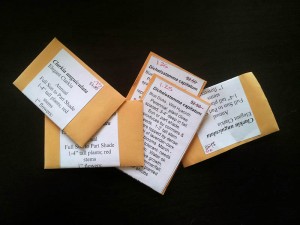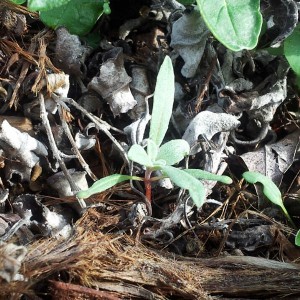I often talk about all the weeds that come up in the garden. But fortunately there are lots of good guys coming up nicely.
One little experiment the past two autumns and winters has been seeing how well well old seed would germinate. Many gardeners end up with a drawer full of old seed packets, and I’m definitely one of them. The little envelopes can often say something like “Packed for the 2012 season” on them, but in reality you can often get good germination from seed that’s one or more years beyond the “buy by” date. Depending on the species, if you keep the unused seed dark, dry and fairly cool, you can let you have excellent results for several years to come. For this highly unscientific test I tried out seeds of several California natives:
- Baby blue eyes (Nemophila menziesii)
- Chia (Salvia columbariae)
- Scarlet bugler (Penstemon centranthifolius)
- Showy penstemon (Penstemon spectabilis)
- Parry’s phacelia (Phacelia parryi)
- Chinese houses (Collinsia heterophylla)
- Beach evening primrose (Camissonia cheiranthifolia)
There was also a year-old, unopened packet of globe gilia (Gilia capitata) that I thought I’d lost but much later found underneath the passenger’s seat of the car. It had spent all of spring and summer and fall inside a closed-up vehicle–abysmal seed storage conditions, nothing like what you find being used in seedbanks like the Svalbard Global Seed Vault, where temperatures are maintained around zero Fahrenheit and humidity also down near to just a few percent.
To increase chances that I’d have at least some plants I sowed the seed thicker than I might have with fresh seed. Some of it was sown directly on the surface of the garden soil. Some of it was mixed with topsoil. I tried to keep the areas somewhat moist, but I failed so that everything dried out completely more than once. Like I said, this test was highly unscientific.
So…drumroll please…
At least two plants of the Chinese houses germinated and made it to flowering.
Unfortunately I think that the Parry’s Phacelia for the last two years have been no-shows. and I’d say the same for the two penstemons. Also the same for the baby blue eyes. It’s always possible that I mistook some of these for lookalike weeds and pulled them, though–trust me–I haven’t been particularly meticulous in the weeding department!
Chia also came up pretty well, though not nearly as lushly as the Camissonia .
 And remember the abused packet of globe gilia seeds? The ones that spent three seasons locked inside a car? I was expecting a big fat zero germination rate, but these came up the strongest of all. Look at all that green!
And remember the abused packet of globe gilia seeds? The ones that spent three seasons locked inside a car? I was expecting a big fat zero germination rate, but these came up the strongest of all. Look at all that green!
Since this test was so randomly conducted you can’t really write off that Nemophila, Phacelia and Penstemon seed is short-lived. It really could have been my rough conditions for germinating seeds that kept them from coming up. But the Camissonia, chia, Collinsia and–most spectacularly–Gilia not only will come up when they’re a little stale, but are also a little more immune to less-than-ideal germination conditions–like out in nature.
 Armed with this information I picked up some marked-down seed at this fall’s native plant sale, some of last year’s stock that had been marked down to half. Call me cheap. Call me curious. But if I’m successful this spring could be pretty flowery in the garden. Wish me luck!
Armed with this information I picked up some marked-down seed at this fall’s native plant sale, some of last year’s stock that had been marked down to half. Call me cheap. Call me curious. But if I’m successful this spring could be pretty flowery in the garden. Wish me luck!
And what kind of success have you had with old lots of seeds?


I can never resist the siren call of seed sowing, despite a spotty success rate, even with fresh seed. When going through those drawers of oldish seed, I will often mix them all together with some builders sand and strew them in an area where they can duke it out. Needless to say, it’s an even less scientific method than yours. Sometimes a few things will show up even a year or two after the fact.
I’m almost willing to lay off the science and call it pure magic…a tiny seed growing up to be a relatively immense plant.
For me, it seems more about the weather and which birds happen to swing by for a snack of fresh seedlings. Sometimes, plants show up that I’ve long forgotten, or seeds don’t sprout that really should. But that’s part of the fun – a surprise every day!
Ah, yes, there’s always the critter hazard to tasty new greens. At least there aren’t that many munchers in the garden in the driest places in the garden where the seeds are going–at least of the snail and slug kind. I suspect I’m the seedlings’ worst hazard, forgetting to water.